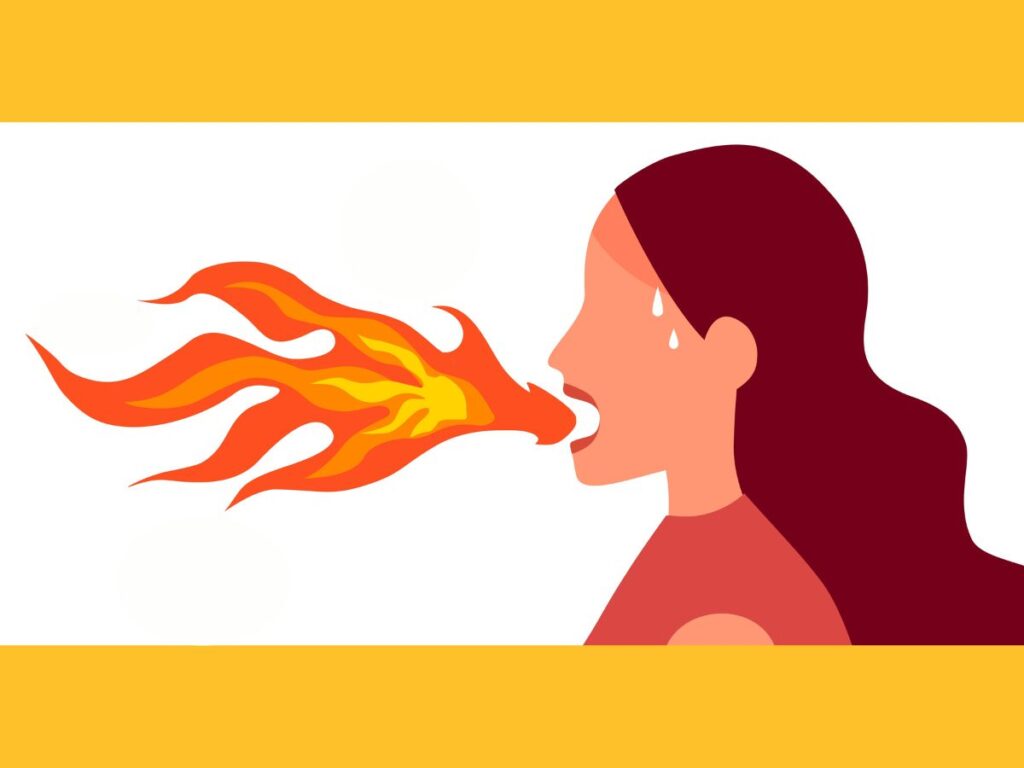
Many women experience a common constellation of symptoms when they enter menopause, from changes in their menstrual cycle to insomnia, hot flashes, sexual dysfunction, and mood changes. Nevertheless, there are some lesser-known menopause complaints that may surprise you.
In the past decade, research seems to suggest that burning mouth syndrome can be an unpleasant side effect of menopause.
Never heard of burning mouth syndrome? Neither had we. Welcome to yet another bizarre symptom of menopause that no one’s talking about.
What Is Burning Mouth Syndrome?
In general, burning mouth syndrome (BMS) feels as unpleasant as the name sounds. It often presents most commonly as a burning sensation on the tongue, roof of the mouth, or lips. However, it can also affect the throat.
There can be a sudden onset of BMS symptoms, including burning, tenderness, tingling, heat, scalding, and numbness as if one had been burned by a hot beverage.
Patients suffering from BMS often report that the burning sensation worsens throughout the day. Although sufferers have difficulty falling asleep, pain may ease once they fall asleep, but will return the following morning.
RELATED: ‘Frozen Shoulder’ Is An All Too Common Menopause Symptom For This Simple Reason
In addition to the burning sensation, patients report a bitter or metallic taste. There is also a tendency for sufferers to complain of a dry mouth despite having a regular flow of saliva.
According to some patients, the pain is so severe that it can lead to irritability, mood changes, depression, and anxiety.
What Causes BMS?
Researchers are investigating several theories to explain burning mouth syndrome, but no specific cause has been identified.
According to some, BMS is characterized by neuropathic pain and the possibility that the burning sensation is caused by loss of facial nerve function and disinhibition of the trigeminal nerve. The latter is a part of the nervous system that sends signals from the face to the brain regarding touch, pain, and temperature. Consequently, patients experience nerve damage in the area of the tongue that controls taste and pain.
A second interesting theory suggests that BMS is caused by abnormal levels of gonadal, adrenal, and neuroactive steroids. The effects of chronic anxiety and stress are similar to a domino effect, whereby these symptoms disrupt steroid production, thereby causing abnormal neuroactive steroid function in the skin, mucosa, and nervous system.
Studies have shown that the decrease in gonadal steroids, or sex hormones, also interferes with the production of neuroactive steroids. And as you know, menopause sees a decrease in estrogen in the body. The mechanism by which the decrease in neuroactive steroids contributes to BMS symptoms is still being explored.
How Is Burning Mouth Syndrome Diagnosed?
Oftentimes, it’s not easy to distinguish BMS from other conditions because they share similar symptoms. In order to proceed with treatment, it is necessary to rule out a variety of other possibilities.
BMS cases are most commonly caused by oral health issues. In fact, oral health issues account for one-third of all BMS cases. Therefore, patients should first seek medical treatment from their dentists to rule out the possibility of serious oral health complications. Dentists can refer you to specialists if necessary.
A primary care provider, however, may order several tests to confirm a diagnosis if it is determined that you don’t have an oral health issue. Most commonly they’ll order the following tests:
- Allergy tests
- Blood tests
- Imaging tests
- Oral swab tests
- Salivary flow test
- Tissue biopsy
Depending on your situation, they may also refer you to a specialist.
How Is Burning Mouth Syndrome Treated?
Due to its multifactorial nature, BMS requires a more complex management approach. In some cases, patients require the expertise of medical specialists such as dentists, ENT specialists, dermatologists, and endocrinologists.
Benzodiazepine, tricyclic anti-depressants, and gabapentin are commonly prescribed to patients with BMS to control pain, the most challenging symptom.
RELATED: The Brain Drain In Real: How Women Over 40 Can Fight Brain Fog Caused By Perimenopause
Among the alternative therapies are local applications of desensitizing agents like topical capsaicin. Adding hot pepper sauce to water in a ratio of 1:2 has been found to reduce oral symptoms in BMS patients. When applied three to four times per day, it may cause partial or even complete pain relief.
Other treatments involve hormone replacement therapy, a high-fluid diet, nutritional supplements, antioxidative therapy, and cognitive behavioral therapy.
Medications and alternative therapies can be effective in treating existing BMS; however, researchers are suggesting that people can prevent BMS.
Although burning mouth syndrome is poorly understood, stress is widely believed to be a contributing factor. In his work Health Impacts of Yoga and Pranayam: A State-of-the-Art Review, Pallav Sengupta advocates the use of holistic yoga for the prevention and management of stress.
According to him, yoga had a positive impact on the treatment of ‘depression, mood alterations, neuro-hormonal activity, diabetes, and coronary atherosclerosis.’ Further research is needed to determine its effects on BMS.
In severe cases, BMS can take months or even years to resolve on its own. Despite being a possible lesser-known symptom of menopause, there are treatments available. By speaking with your healthcare provider today, you can find a solution and get pain relief.
More From Suggest
- Win $2,200 In Prizes From These 5 Brands That Are Making Midlife Women Feel Seen
- 10 Eye-Opening Tips This OBGYN Wished She Knew Before Perimenopause
- Working With Menopause Symptoms Ranks More Difficult Than Starting A Family: Why Employers Need To Pay Attention
-----------------------------------
By: Brittany Baxter
Title: Burning Mouth Is A Symptom Of Menopause We Don’t Often Talk About
Sourced From: www.suggest.com/burning-mouth-menopause-symptom/2679915/
Published Date: Wed, 26 Oct 2022 11:45:00 +0000
Read More
Did you miss our previous article...
https://thegossip.news/hollywood/melissa-gorga-addresses-jennifer-aydin-drink-toss-incident-at-bravocon
.png) SportsFashionPoliticsVideosHollywoodPrivacy PolicyTerms And Conditions
SportsFashionPoliticsVideosHollywoodPrivacy PolicyTerms And Conditions
